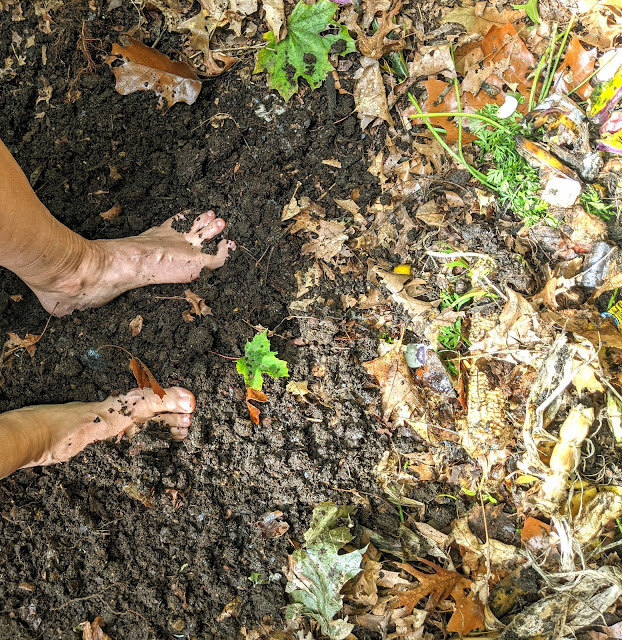I did a little research last week about fall harvest festivals in the Netherlands and England (some of the areas my Ancestors came from)... and noticed a connection to potatoes. That spoke to me for some reason. So at my local farmers market yesterday, I cradled a purple potato in my hands and tapped into emotion right away; I cried! But just a little since it was not the time and place for more, but found that intriguing anyway. I bought multiple potatoes to take home and use to connect with my Ancestors.
I decided to start with this ritual today, in my compost pile. The compost represents the cycle of life and nourishment. This is what I planned:
- stir it
- put bare feet and hands in it
- connect to worms who process the waste from our kitchen into rich, nutrient soil for use back in the garden
- thank the worms for doing what they do so well
- thank my Ancestors who grew food and flowers too and taught me to care about the land and what grows from her
- give offering of water
- put bare feet and hands in it
- connect to worms who process the waste from our kitchen into rich, nutrient soil for use back in the garden
- thank the worms for doing what they do so well
- thank my Ancestors who grew food and flowers too and taught me to care about the land and what grows from her
- give offering of water
My feet are still tingling from this experience. I feel cleansed by the soil.
- they come from the earth, sustain me as food
- represent for me my Ancestors who ate, (maybe) grew, and (maybe) celebrated them
- encircle me with 6 of them on the grass (on top of heart shaped leaves)
- each one represents a generation (the last one represents all other generations)
- bare feet and hands
- hold each, one at a time
- listen to what my Ancestors want to share with me at this time
- thank them
- apologize for being disconnected
- bare feet and hands
- hold each, one at a time
- listen to what my Ancestors want to share with me at this time
- thank them
- apologize for being disconnected
- show my openness to being connected more
- continued to listen with family gathering later
(got the new message from my Ancestors that they are always with me, I am not alone)
I connected on my own after my partner took these pictures to share with you. I don't want to be performative, just motivational...if any of this speaks to you to practice for yourself, I invite you to connect with your Ancestors in your own way.
I am wondering if you would want to be a part of this exploration with me as my birthday celebration this year? If so, let me know. I will invite you to bring a potato (or another root vegetable, or a potted plant that's in soil) to a Zoom gathering. Bring something that once was/is very deeply connected to the earth. One thing we could do with the potatoes (or other root) is hold them and think how they connect us to our Ancestors. We could imagine and feel out what our Ancestors are telling us, how they are supporting us, and what they have passed on to us...what gifts we received from our Ancestors? Then we can share the messages we heard with each other.
I want to start this and some other new traditions that work for me as I don't connect with most holidays of the year. I have an idea for the spring too...connecting with the hope our Ancestors had.
I want to start this and some other new traditions that work for me as I don't connect with most holidays of the year. I have an idea for the spring too...connecting with the hope our Ancestors had.
Tulip bulbs
- represent hope
- give one each to family members to plant in their own ritual of appreciation and thoughtfulness
- give one each to family members to plant in their own ritual of appreciation and thoughtfulness
- about potential for them to be flowers after a season of rest, then root growth
- mindful of the earth and water that is given to them to sustain them
- mindful of the earth and water that is given to them to sustain them
Hope Ritual: Connecting with Our Ancestors
- in April (or when tulips open)
- share appreciation...
- share appreciation...
for the miracle of flowers coming from seeds and roots
for bees who spread pollen
for the earth and water that sustains them
for bees who spread pollen
for the earth and water that sustains them
- more on this event later.




